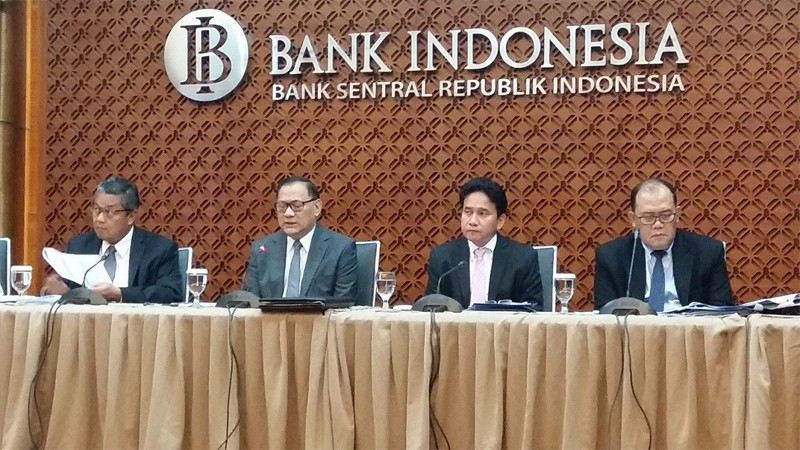Popular Reads
Top Results
Can't find what you're looking for?
View all search resultsPopular Reads
Top Results
Can't find what you're looking for?
View all search resultsBI plays safe, expects to see lower bank lending rate
Change text size
Gift Premium Articles
to Anyone
 Guardians of monetary policy: Bank Indonesia deputy governor Perry Warjiyo (left), governor Agus Martowardojo (second left), senior deputy governor Mirza Adityaswara (second right) and deputy governor Hendar speak at a press conference at the central bank office in Jakarta on Thursday. (JP/Anton Hermansyah)
Guardians of monetary policy: Bank Indonesia deputy governor Perry Warjiyo (left), governor Agus Martowardojo (second left), senior deputy governor Mirza Adityaswara (second right) and deputy governor Hendar speak at a press conference at the central bank office in Jakarta on Thursday. (JP/Anton Hermansyah)
B
ank Indonesia (BI) expects to see a continuing downward trending interest rate cycle in the banking sector, even though the central bank has recently put the brakes on its own monetary easing.
Bank Indonesia (BI) Deputy Governor Perry Warjiyo said on Friday that the decline in lending rates could reach more than 100 basis points (bps) before next year.
“Monetary policy transmission into the banking industry will still occur because the lending rate has yet to decline significantly. The decline in time deposit rates already reached an average of 130 bps and we can expect another 20 bps, while lending rates may decrease by at least 50 bps more,” he said.
BI decided to keep its benchmark interest rate — the seven-day reverse repo rate — at 4.75 percent during its latest board of governors meeting that ended on Thursday.
In total, BI has cut its key interest rate six times with a total 150 bps throughout this year in the hope that lowered borrowing costs will trigger company demand for bank loans and spur economic activities in the country.
However, banks’ lending rate has fallen by an average of 67 bps so far.
Demand for loans is yet to improve due to the slump in global commodity prices and a weak economy, which have caused a rise in non-performing loans (NPLs), which discourages banks from providing easy loans for companies.
As a result, loan growth as a percentage has remained in single-digits this year; a situation unseen in previous years.
Perry acknowledged that banks were still in “consolidation” mode as they felt the need to increase their loan provisions to cope with the increased number NPLs.
The central bank insists that its latest decision cannot be translated as a shift into a tightening mode as it remains focused in its effort to spur economic growth through other measures.
Instead, its current signal should be read as one that is “cautiously accommodative” of economic growth, meaning it will still implement policies to accommodate growth with extra prudence to face external changes, Perry said.
It will also monitor some risks coming from the domestic side, such as the possibility of higher inflation coming from the government’s plan to reduce electricity subsidies next year.
Meanwhile, bankers projected that the recent hike in the US’ Federal Reserve’s rate could trigger outflows and make it more difficult for lending rate to decline.
Coupled with low demand for loans, the situation is likely to put bankers in wait-and-see mode.
Bank Central Asia (BCA) director Suwignyo Budiman said the declining trend in lending rate had started to flatten recently at the lender, which has drastically cut its time deposit rate to a level as low as 5.5 percent and has offered a lower lending rate for mortgages and several other loans.
“Our lending rate has been declining this year, but it may be difficult to continue the decline because the Fed rate has risen. We still don’t know whether or not the [BI] rate will rise next year, but our rate will probably be unchanged if there is no change [in the BI rate],” he said.
Bank Negara Indonesia (BNI) director Bob Ananta said it would have to analyze the situation, adding that “we are still consolidating”.









